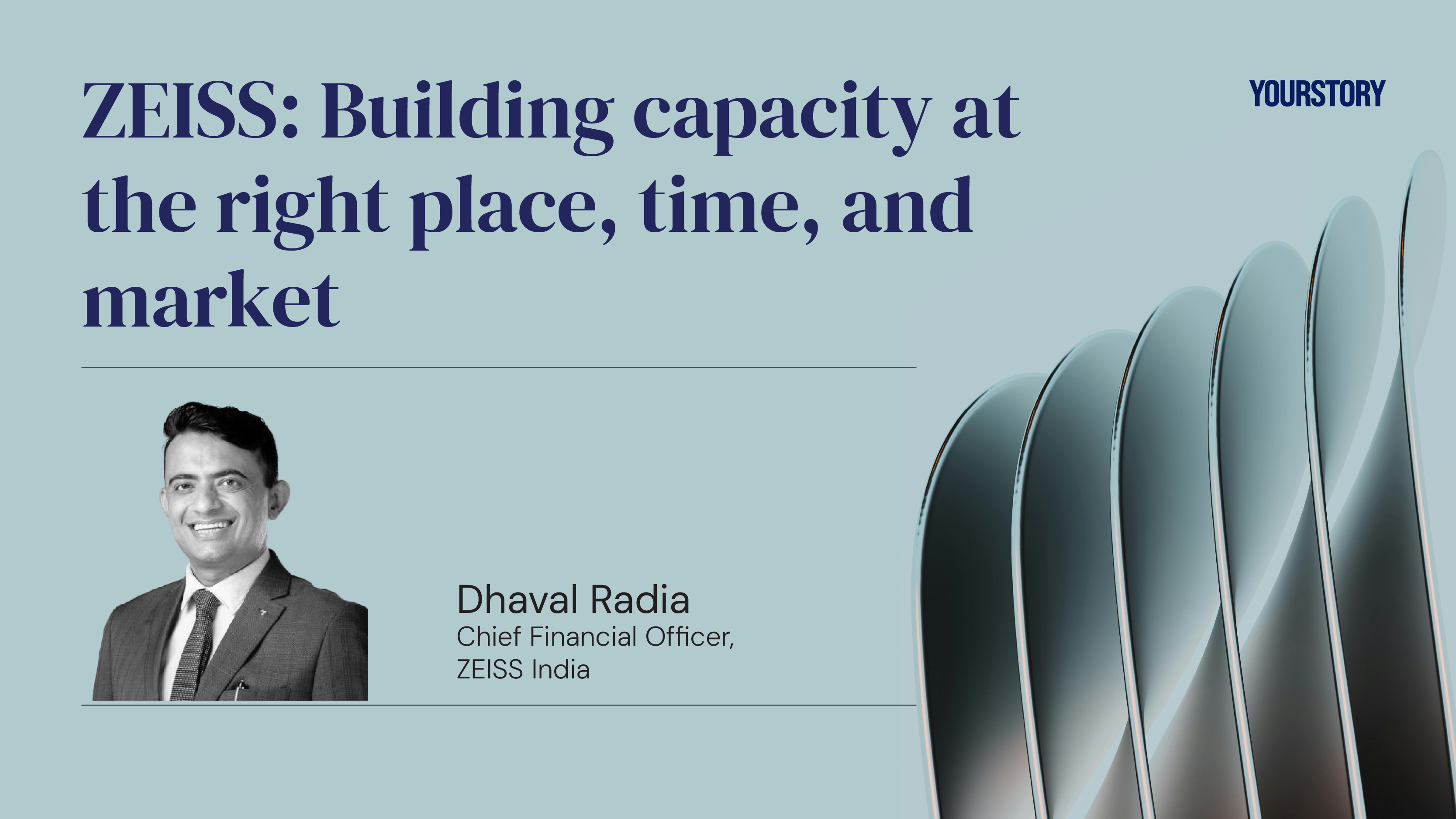By Dhaval Radia
Copyright yourstory

In this exclusive authored piece for YourStory’s latest report titled ‘Building Tomorrow’s GCCs’, Dhaval Radia, the CFO of ZEISS India, shares insights on how the company transformed from establishing a research center in 2011 to building a unified Global Capability Center that drives healthcare innovation and digital transformation across India and globally.
While research, data, and macro trends provide the scaffolding for understanding India’s GCC evolution, the most compelling narratives emerge from the leaders shaping that journey on the ground. In this section, we bring you four powerful perspectives from pioneering GCCs across healthcare, automotive, and semiconductors that illustrate how different industries are leveraging India’s potential in distinct and meaningful ways.
Whether it’s ZEISS creating next-gen healthtech capabilities in Bengaluru, HARMAN Automotive building global mobility platforms across multiple cities, or Signature IP reimagining silicon innovation from Bhubaneswar, or Sanofi shaping AI-driven pharmaceutical solutions from Hyderabad, these stories reflect the depth, diversity, and dynamism of the Indian GCC landscape.
What makes these accounts stand out are the bold bets they’ve placed on talent, decentralization, ESG, and purpose-driven growth. Each piece offers a unique window into how global innovation strategies are being localized, customized, and amplified across India
ZEISS began the journey to GCCs in 2011 by establishing the Center for Applied Research in India for our Medical Technology business. This initiative was conceived to leverage India’s talented resource pool to drive research and innovation in healthtech. Over the years, various functions and teams emerged in India to address specific needs within the ZEISS Group.
As a result, we have developed deep expertise in areas such as cybersecurity, analytics, software development, product life-cycle management, digital transformation, and HRtech. Last year, we made the decision to consolidate these diverse initiatives under a unified umbrella called the GCC. We took this step to create a cohesive identity and build scale. And that is how ZEISS India Global Capability Center (ZIGCC) was established.
Today, we’re engaged in a variety of initiatives that cover a wide range of services, from traditional operations to strategic research and development (R&D) as well as product development. Our primary mission is to improve our products and services for our customers while optimizing our internal processes to align with the changing dynamics of the global market. Additionally, we are committed to driving digital transformation both in India and around the world.
GCCs: Accelerating research and development for healthcare
GCCs in India are significantly transforming the healthcare, pharmaceutical, and biotechnology industries by acting as innovation hubs dedicated to research and development. They utilize India’s vast talent pool and technological advancements to enhance medical technology innovation, improve the efficiency of clinical trials, and advance data analytics for better healthcare outcomes.
This emphasis on R&D within GCCs allows global companies like ours to create new therapies, enhance diagnostics, and streamline processes, ultimately driving advancements across the healthcare spectrum both in India and worldwide.
What’s more, India is home to both the world’s largest talent pool, and boasts one of the largest healthcare markets globally. That’s a potent combination of immense demand with significant supply.
Nearly 93% of our population is currently in the working age group of 18 to 65. As this population ages, the need for high-quality healthcare will increase over the next few decades.
At the same time, India’s average per capita income is projected to rise significantly, enabling over a billion people to afford access to quality healthcare services. Therefore, any healthcare company would naturally benefit from establishing a strong foundation in India today, which they can leverage for growth in the coming decades.
Bengaluru: Talent, train, transform
Our experience in hiring tech and operations talent in Bengaluru reveals a varied landscape. Recruitment can be more targeted and deliberate for specialized roles that require deep expertise or for positions in entirely new domains. However, Bengaluru also has a diverse talent pool for roles where individuals can be effectively trained. We actively recruit from a wide range of institutions, including top-tier national institutes like IITs and IIITs, as well as prominent engineering colleges in Bengaluru, such as BMS College of Engineering and Rashtriya Vidyalaya College of Engineering (RVCE).
This approach allows us to connect with both experienced professionals and promising fresh graduates. Within ZEISS, we have a robust and well-defined Learning and Development program to ensure that our employees receive the necessary periodic training to upgrade their skill sets.
We have also partnered with the Indian Institute of Science in Bengaluru to develop an “AI for Eye Care” program. This initiative aims to utilize artificial intelligence to create practical, technology-based eye care solutions that can be seamlessly integrated into existing patient workflows and deployable at scale. In addition to this, we have several ongoing discussions that we expect will come to fruition soon.
ZIGCC: A hub for nextgen innovators
The ZEISS India Global Capability Center (ZIGCC) is located in Prestige Tech Park, Belandur. Our facility is designed to accommodate over 600 innovators and provide them with the laboratory space necessary for developing the next generation of innovations in the field of network security, cloud computing, generative AI, software development, digital transformation, and HR technology.
We have curated this facility to foster innovation, creativity, and collaboration. Every element of our office space has been thoughtfully designed with our values of sustainability and teamwork in mind. It features an elegant combination of workstations, conference rooms, lab spaces, and collaboration areas.
Spacious individual workspaces are available for those who wish to focus deeply. Employees have access to stimulating environments conducive to brainstorming, whiteboarding, and light recreation.
Additionally, our commitment to ESG is highlighted in our upcoming factory in Devanahalli, Bengaluru. This facility will incorporate initiatives such as water recycling and the use of renewable energy sources.
Infrastructural roadblocks
For us, the most significant gap in infrastructure is the physical infrastructure of the city itself. While we can create excellent workplaces, it is becoming increasingly difficult for employees to fully access and take advantage of them; the average daily commute to any office is now 2-3 hours round-trip a day for each employee.
This significantly hampers productivity and innovation, resulting in a substantial waste of time, investment, and effort. To mitigate these issues, we’ve implemented a flexible hybrid work policy, however, the downside is that it can lead to reduced collaboration amongst teams when it comes to ideation and brainstorming.
Additionally, we have observed that our education curricula are not keeping pace with industry needs. In many cases, hiring recent graduates and placing them on high-stakes projects is challenging.
It requires considerable time and training efforts with new hires before they can contribute effectively. This could be addressed by ensuring that our academic programs provide practical training better aligned with the real-life challenges of tomorrow.
Developing India: one city at a time
For the GCCs venturing into Tier II and III cities, I’d first like to say, congratulations on being a trendsetter and an early adopter. It takes courage to follow a path that is less traveled. My message to them is to focus on giving back to the communities in these cities in intentional ways.
This will help create an ecosystem in these Tier II and III towns, encouraging other industries and corporations to move in and build a vibrant economy for everyone. As innovators, we have a fundamental obligation not only to build a GCC but also to contribute to the development of our nation, one city at a time.
This article is excerpted from YourStory’s latest report, ‘Building Tomorrow’s GCCs’.
[Click here to download the report].



